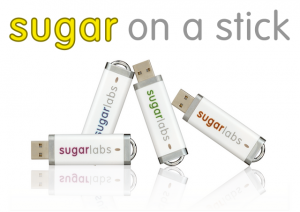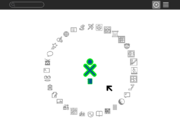Difference between revisions of "Sugar on a Stick"
(remove language that is so sappy it makes kittens cry, so wishy-washy I could do the dishes with it, or so redundant that it's redundant. Reorganise a bit too.) |
|||
| Line 9: | Line 9: | ||
{{TOCright}} | {{TOCright}} | ||
== Introduction == | == Introduction == | ||
| − | Sugar on a Stick (SoaS) | + | Sugar on a Stick (SoaS) enables children to reclaim computers. SoaS aims to make it easy for children, parents, or local deployers to provide each student with a small device (stick) that can starts any computer with the student's personalized Sugar environment. We would like to see [[Sugar]]'s presence, journal, and clarity principles usable on any machine — at school, at home, and anywhere there is a suitable computing device. |
| − | |||
| − | |||
| − | |||
| − | |||
| − | |||
{| class="wikitable" | {| class="wikitable" | ||
| Line 23: | Line 18: | ||
== Project Principles == | == Project Principles == | ||
| − | * ''Portability'' - | + | * ''Portability'' - One's Sugar environment, saved Activities, and Journal are available wherever one has access to suitable computing devices, at home, school, library, clubhouse in order to permit resumable, extended, and deep exploration of concepts and phenomena. |
| − | * ''Customizability'' - Deployments, as well as users, | + | * ''Customizability'' - Deployments, as well as users, can build their own SoaS easily. |
| − | * ''Deployability'' - SoaS | + | * ''Deployability'' - SoaS is easy to deploy, both for individual sticks and for multiple-instances deployed in computer labs. |
* ''Local Support'' - We must encourage and foster the growth of local community involvement in deployments. We must build things in a way that deployers can take over design and construction and fix most of their own problems. | * ''Local Support'' - We must encourage and foster the growth of local community involvement in deployments. We must build things in a way that deployers can take over design and construction and fix most of their own problems. | ||
| Line 37: | Line 32: | ||
Please let us know how it goes. You can always [[Sugar on a Stick/Contacts| get in touch]] with us! | Please let us know how it goes. You can always [[Sugar on a Stick/Contacts| get in touch]] with us! | ||
| − | See these other [[:Category:Live USB|portable Sugar distributions]] that share | + | == More information == |
| + | |||
| + | For general questions, please see the [[/FAQ|Frequently Asked Questions (FAQ) page for Sugar on a Stick]]. You can learn more from [http://www.xconomy.com/boston/2009/02/05/sugar-beyond-the-xo-laptop-walter-bender-on-olpc-sucrose-084-and-sugar-on-a-stick/ Walter Bender's interview with Xconomy], [http://www.olpcnews.com/software/sugar/sugar_on_a_stick_netbooks.html Wayan Vota's video] and [http://www.flickr.com/photos/curiouslee/sets/72157613785006745/ Mike Lee's pictures]. | ||
| + | |||
| + | == Related work == | ||
| + | |||
| + | See these other [[:Category:Live USB|portable Sugar distributions]] that share some of these goals. | ||
Revision as of 05:55, 2 November 2009
Project Home · Get Involved · Contacts · Resources · FAQ · Roadmap · To Do · Meetings
|
|
 Sugar on a Stick Pineapple released 08 November 2011 |
Introduction
Sugar on a Stick (SoaS) enables children to reclaim computers. SoaS aims to make it easy for children, parents, or local deployers to provide each student with a small device (stick) that can starts any computer with the student's personalized Sugar environment. We would like to see Sugar's presence, journal, and clarity principles usable on any machine — at school, at home, and anywhere there is a suitable computing device.

|
What exactly is on the Stick?: Sugar + Fedora GNU/Linux. Taking advantage of Live USB technology, it's possible to store everything you need to run Sugar on a single, USB flash memory stick. Compressed file systems are used to save space, and persistent overlay files are used to save changes to the system and user's files. See our resources page to learn about different component configurations we are designing to offer the option to use virtual machines on existing computers to host Sugar from a portable Stick and save the Sugar Journal (the learner's work) and personal settings on the Stick for use at another workstation. |
Project Principles
- Portability - One's Sugar environment, saved Activities, and Journal are available wherever one has access to suitable computing devices, at home, school, library, clubhouse in order to permit resumable, extended, and deep exploration of concepts and phenomena.
- Customizability - Deployments, as well as users, can build their own SoaS easily.
- Deployability - SoaS is easy to deploy, both for individual sticks and for multiple-instances deployed in computer labs.
- Local Support - We must encourage and foster the growth of local community involvement in deployments. We must build things in a way that deployers can take over design and construction and fix most of their own problems.
Would you like to help? ...this is entirely a volunteer-run effort. Please get involved!
Getting Sugar on a Stick
Follow the instructions for our most stable, Strawberry release.
Developers and testers can help us debug the v2 Beta test builds. See Sugar on a Stick/Beta.
Please let us know how it goes. You can always get in touch with us!
More information
For general questions, please see the Frequently Asked Questions (FAQ) page for Sugar on a Stick. You can learn more from Walter Bender's interview with Xconomy, Wayan Vota's video and Mike Lee's pictures.
Related work
See these other portable Sugar distributions that share some of these goals.
